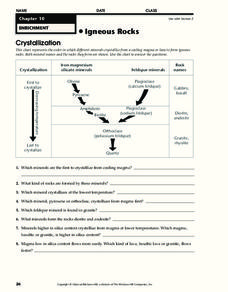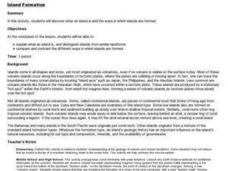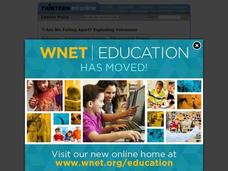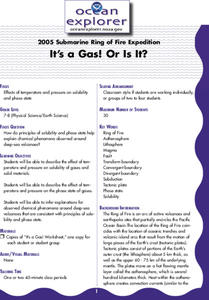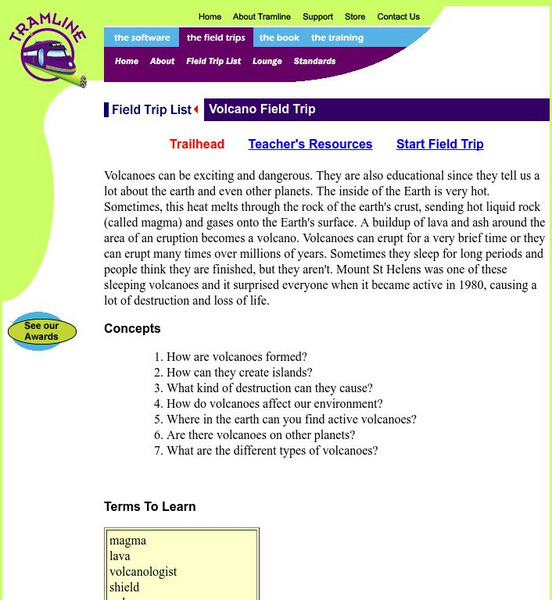Curated OER
The Rock Cycle
In this rock cycle worksheet, students study the diagram of the rock cycle and explain how minerals originally in magma could travel through the cycle. Then they identify how these minerals end up in each of three main classifications of...
Curated OER
Igneous Rocks
In this igneous rocks learning exercise, students identify and explain which minerals are the first to crystallize from cooling magma according to the diagram shown. Then they describe what types of rocks are formed by those minerals....
Curated OER
Igneous Rocks
In this igneous rocks activity, students identify the lave that cools quickly and entraps air and other gases. Then they describe the molten material found below the Earth's surface. Students also give another name for the mineral...
Curated OER
Metamorphic Rocks
In this metamorphic rocks worksheet, students name the components that change in size and shape when metamorphic rocks are formed. Then they describe the metamorphic rock formed from shale and its texture. Students also name the rocks...
Curated OER
Earthquakes & Volcanoes
In this earthquake and volcano worksheet, students use the Internet site given to complete each of the questions. They identify and describe various major earthquakes that have occurred in the US. Then they describe where molten rock...
Curated OER
Station: Earth's Interior
In this earth science activity, students cut out each die pattern and the signs for each station. Then they assemble the dice by folding along lines and taping the edges together. Students also follow the written instructions for...
Curated OER
Chemistry: Mini-Volcanoes
Pupils observe an experiment using common household chemicals to simulate a volcanic eruption. In small cups, they follow the teacher's instructions to make their own volcanoes. After watching a Brain-pop video, students complete...
Curated OER
How Does Your Magma Grow?
Students identify the three types of plate boundaries and the Earth's tectonic plates system. They examine how the Galapagos Islands were formed and hydrothermal vents.
Curated OER
What's the Difference?
High schoolers discover how volcanic processes differ at convergent and divergent tectonic plate boundaries. They identify three geologic features that are associated with most volcanoes on Earth.
Curated OER
Plate Tectonic - Volcanoes
Students examine how all mountains are not volcanoes by dramatizing how volcanoes erupt.
Curated OER
Igneous Rocks/Volcanoes
Students differentiate between the two types of igneous rock and designate the area the rock comes from.
Curated OER
Gelatin Volcanoes
Students enjoy a hands on activity to understand how and why magma moves inside volcanoes.
Curated OER
Volcanoes!
Young scholars define what a volcano is. They discover where and why volcanoes occur. They study effects of volcanoes on the Earth system.
Curated OER
Missouri Time Scale
Learners plot events that happened years ago beginning with volcano activity. In this investigative lesson students are introduced to the different eras and plot them on a map.
Curated OER
Magma and Lava Venn Diagram
In this magma and lava worksheet, students use the Venn diagram to show the similarities and differences between magma and lava.
Curated OER
What Are Earthquakes And Volcanoes?
In this earthquake and volcano worksheet, students will write down what causes earthquakes and volcanoes to form and how these events are related to one another. This worksheet is a graphic organizer.
Curated OER
Island Formation
Students create models of how islands are formed by hot spots and then write a summary of their observations and of how they think their model relates to volcanic hot spots and island formation.
Curated OER
Are We Falling Apart? Exploding Volcanoes
Students explore how volcanoes are formed, list the parts and characteristics of volcanoes, state the differences in various types of lava, and analyze the volume of ejecta from a volcano.
Curated OER
It's a Gas! Or is it?
Students discover the principles of solubility and phase state and their influence on chemical phenomena observed around deep-sea volcanoes. They describe the effect of temperature and pressure on solubility of gasses and solid materials.
PBS
Pbs Learning Media: Volcanic Eruptions and Hazards
This interactive resource adapted from the National Park Service illustrates the difference between explosive and effusive volcanic eruptions, as well as the hazards that can result, including lahars, tsunamis, and lava flows.
Tramline
Virtual Field Trip: Volcanoes
In this virtual field trip find out about how volcanoes are formed and what kind of destruction can they cause. Discover how volcanoes affect our environment and where can you find active volcanoes on earth and on other planets.
Science Education Resource Center at Carleton College
Serc: Investigating the Rock Cycle Through Writing and Illustrating
For this writing and illustrating activity, students will be able to follow a simple rock cycle to follow the life of "Rocky the Rock". After investigating the rock cycle, students will then be able to illustrate the rock cycle, along...
Science Education Resource Center at Carleton College
Serc: Investigating Lava Flows and Their Imapct on Shoreline Features
In this field geology activity, students will explore basaltic lava flows along the shoreline of Lake Superior, and begin to gain an understanding of the geologic story of Minnesota's North Shore. They will make observations about...
Other
Digital Library for Earth System Education: Teaching Box: Plate Tectonics
A suite of lessons focusing on finding the fossil evidence for lithospheric plate tectonics. Inquiry-based exploration of plate tectonics evidence includes fossil distribution, earthquakes, and volcanoes.



